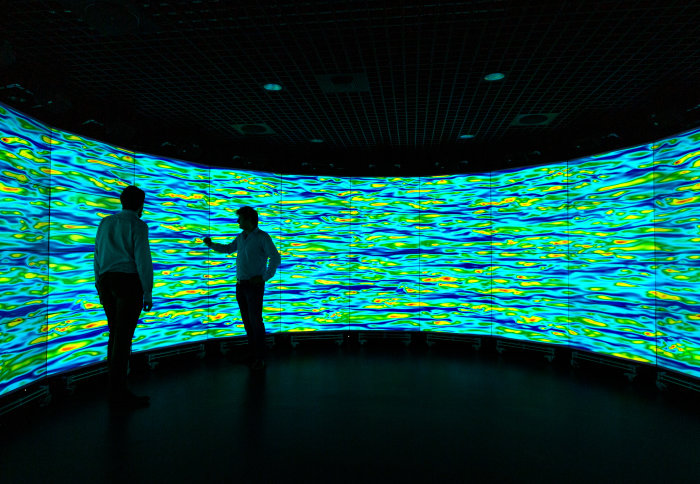Data Science Institute celebrates fifth birthday with distinguished lectures

Imperial's Data Observatory is Europe’s largest data visualisation suite
Imperial College London’s Data Science Institute (DSI) is celebrating its fifth birthday with a series of lectures.
I am immensely proud of the DSI and what we, as a College rich in knowledge of data science, computing and mathematics, have achieved over the past five years. Professor Yike Guo Director, Data Science Institute
The DSI was founded in April 2014 by Director Professor Yike Guo, of Imperial's Department of Computing. His aim was to foster, advance and promote excellence in data science research, education and application across all domains for the benefit of society.
Over its five years, the DSI has successfully built strong networks and collaborations both nationally and internationally with industry, academia and government bodies.
Its main achievements to date include building the Europe’s largest data visualisation suite, the Data Observatory, setting up joint academic labs with several international industry organisations, and forming the hub of Imperial’s data science research and education.
The DSI launched its anniversary celebrations on 17 September 2019 with a talk on “Automating Science using Robot Scientists”.
The eight lectures in the series are open to all, and will conclude with the DSI’s annual lecture, given by the Rt Hon Lord David Willetts, on Monday 4 November. The lectures span data science, AI, machine learning, smart algorithms, and robots - and the ethics and theory behind them.
Professor Guo, said: "I am immensely proud of the DSI and what we, as a College rich in knowledge of data science, computing and mathematics, have achieved over the past five years. DSI researchers have published over 300 papers and, thanks to its many research collaborations both across Imperial and with a variety of academic and industry partners, the DSI has established itself as an international hub on data science."
DSI birthday celebration events, 2019
“Automating Science using Robot Scientists” by Professor Ross King (University of Manchester)
17 September
Professor King will discuss his creations, the Robot Scientists ‘Adam’ and ‘Eve’, which are the first machines to autonomously discover scientific knowledge by forming and experimentally confirming new hypotheses. Adam works in the domain of yeast functional genomics, while Eve was developed to automate early-stage drug development.
“Reconciling Deep Learning with Symbolic AI” by Professor Murray Shanahan (Imperial & DeepMind)
26 September
Professor Shanahan’s work spans artificial intelligence, robotics, machine learning, logic, dynamical systems, computational neuroscience, and philosophy of mind. In this talk, he will discuss neural network architectures that learn to acquire and exploit relational information, and will present recent DeepMind work on learning explicitly relational representations.
“Building Brains – artificial and biological intelligence” by Professor Stephen Furber (University of Manchester)
1 October
Professor Furber works on neural systems engineering, and has created computers that can model the human brain. His talk will focus on these computers, known as neuromorphic computers, and their potential applications.
“Methods of Machine Learning for Inference from Outliers” by Professor Niranjan Mahesan (University of Southampton)
8 October
Professor Mahesan works on machine learning algorithms, focusing on data-driven inference problems in computational biology. In this talk, he will discuss the problems facing smart algorithms when they are applied to target tracking, condition monitoring of complex engines, and patient health monitoring in an intensive care setting.
“Me and my Markov blanket” by PROFESSOR KARL FRISTON (University College London)
17 October
Professor Friston is a theoretical neuroscientist and authority on brain imaging. In this talk, he will argue that life - or biological self-organisation - is an inevitable and emergent property of any random dynamical system with Markov blankets – a type of ‘cognitive membrane’ that separates our world-view from pure reality.
“Algorithmic Human Development: what is it and why do we need it now?” by Professor Abbas Edalat (Imperial)
24 October
Professor Edalat is an expert in mathematical and logical theories of computation, as well as a political and social activist. His talk will focus on ways to enhance emotional and social intelligence and creativity in humans, in order to handle the existential problems we currently encounter as a species. Professor Edalat will also give the results of a long-term pilot project on the subject and then describe a ‘laughter protocol’ which directly challenges old and entrenched beliefs of the ‘Bayesian brain’ about past misfortunes and tragedies.
“Socially Responsible AI” by Dame Wendy Hall (University of Southampton)
30 October
Dame Wendy is an expert in artificial intelligence, and was recently named the UK government’s first Skills Champion for AI in the UK. She will discuss what socially responsible AI means, and will look at current attempts to ensure AI development is undertaken in a socially responsible, ethical, and diverse way, before discussing what should be done to ensure we build AI systems in a way that is good for humanity.
Annual Lecture event: “THE FUTURE OF RESEARCH IN THE UK” by Lord David Willetts
4 November
The final lecture in the series will be delivered by the Rt Hon. Lord Willetts, who will discuss the future of research in the UK.
Lord Willetts is President of the Resolution Foundation, an independent think-tank focused on improving the living standards for those on low to middle incomes. He served as the Member of Parliament for Havant (1992-2015), as Minister for Universities and Science (2010-2014) and previously worked at HM Treasury and the No. 10 Policy Unit.
Lord Willetts is a visiting Professor at King’s College London, a Board member of UK Research and Innovation (UKRI), a Board member of Surrey Satellites and of the Biotech Growth Trust. He is the Chair of the Sanger Institute and the Chair of Foundation for Science and Technology. He is an Honorary Fellow of Nuffield College, an Honorary Fellow of the Royal Society and the Chancellor of the University of Leicester.
Article text (excluding photos or graphics) © Imperial College London.
Photos and graphics subject to third party copyright used with permission or © Imperial College London.
Reporter
Caroline Brogan
Communications Division